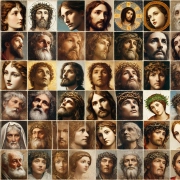Faith is harmful (?)
by Cristiano Meregaglia, GBU Staff worker
This article is a summary of a workshop that Cristiano himself offered to the students at our event Formazione GBU (ndr)
“Imagine there’s no heaven / It’s easy if you try / No hell below us / Above us only sky / Imagine all the people / Living for today… / Imagine there’s no countries / It isn’t hard to do / Nothing to kill or die for / And no religion too / Imagine all the people / Living life in peace…”
Lennon, John. Imagine
This is what John Lennon sang in 1971, hoping for a time when people could finally live just for today, without being oppressed by the thought of a heaven or hell awaiting them at the moment of death, and a world where there would be no nations and religions opposing one another, preventing peace that would otherwise be possible.
Of course, even more than 50 years later, these words and these hopes are still present and strong in the society we live in, suggesting that faith is not only rationally unsustainable but also morally harmful, and that, therefore, society would be much more functional if every religious root were to be uprooted from it. This idea has been explicitly supported by the main exponents of t
The “new” ateism
This idea has been explicitly supported by the main exponents of the so-called New Atheism movement, who, without mincing my words, have dedicated long pages to describing the great evils that religion has produced throughout history, from the Crusades to the Jihad, from religious wars to contemporary theocratic regimes, clearly highlighting how the solution for a better world seems to be precisely what the Beatles singer envisioned.
It is interesting to note, however, that although these authors are labeled as new atheists, the ideas they support are anything but new, as they are effectively derived from the reflections of past thinkers. Among these past thinkers, it is impossible to ignore Bertrand Russell, who, with his collection of essays compiled in the text Why I Am Not a Christian, represents, in fact, a normative reference for much of the literature produced within the New Atheism movement.
Religion: a disease to be eradicated
In one of those essays, titled “Has Religion Contributed to Civilization?”, Russell presents precisely those arguments that, decades later, Dawkins, Hitchens, Harris, Odifreddi, Augias, and other contemporary intellectuals continue to propose to argue for the damage religion has caused. Specifically, Russell argues that religion is “a kind of disease, born out of fear and a source of unspeakable suffering for humanity,”, his point of view relating to both the intellectual and moral spheres. On the one hand, the philosopher claims that religion hinders free thought and rational inquiry; on the other, by imposing a morality considered absolute and anchored to archaic concepts, it also creates the conflicts that are at the root of human unhappiness. Thus, he concludes the aforementioned essay writing:
“With the progress of knowledge and technology, universal happiness can be achieved; but the main obstacle to using them for this purpose is the teaching of religion. Religion prevents our children from receiving a rational education; religion prevents us from removing the fundamental causes of wars; religion prevents us from teaching the ethics of scientific cooperation instead of the old, aberrant doctrines of guilt and punishment. Humanity may be on the threshold of a golden age; but to cross it, we must first slay the dragon guarding the door: this dragon is religion.”
Russel, B. “Perché non sono cristiano”, Longanesi & C., Milano, 1960, p.24
Now, as biting as these criticisms may be, it is helpful to point out that it is legitimate, and perhaps even necessary, to agree with some of the claims made in the essay. It is undeniable that many people, claiming to be Christians (or of other religions), have indeed committed reprehensible acts throughout history, often abusing their social position provided to them by religion; and it is equally understandable to agree with the insistence on the need to reject an uncritical faith (one that is not aware of what it believes and why it believes it).
That being said, it is also necessary to point out that such criticisms are, in fact, open to strong counterarguments, which can be articulated along three lines of response.
1. The preaching of Christ and its impact on society
First of all, it is easy to demonstrate how the true Christianity, as embodied and preached by Jesus Christ himself, is radically different from other religions and, in many cases, from how Christians have portrayed it. True Christianity, in fact, far from being a source of violence, has at its root the persuasion through inner contrition rather than external coercion through the use of force. It is of no coincidence, therefore, that when Jesus, just hours before his death sentence, was in Gethsemane and Peter tried to defend him with weapons from his enemies, not only did he order his disciple to put away his sword, but he also healed the servant of the high priest who had been injured by that sword (Mt 26:51-52; Lk 22:51).
Furthermore, it is easy to show that true Christianity is not only not a cause of harm to society but that society as a whole has benefited from the influence of Christianity, which has created hospitals, the Red Cross, orphanages, universities… to the point that an atheist journalist wrote in The Times that in Africa, the contribution of evangelism to the progress of society has far exceeded that provided by any other organization, governmental or otherwise (M. Parris, The Times, 27.12.2008).
2. A society that wants to get rid of God
Secondly, it can just as easily be shown that a society in which God is removed opens the door to any violation and abuse by the powerful, precisely because it removes the premise that one must be accountable for his own actions before a just God. The 20th century is full of such examples, from Stalin’s Russia to Mao’s China, to Pol Pot’s Cambodia. Nobel laureate Aleksandr Solzhenitsyn, in this regard, stated that “if I were asked today to formulate as concisely as possible the main cause of the ruinous Revolution that swallowed up 60 million of our people, I could not put it more accurately than to say: men have forgotten God; that’s why all this has happened” (A. Solzhenitsyn, Templeton Prize Address, 1983).
3. Flawed argument
Finally, it can be pointed out that the very principles by which religion is criticized today are Christian principles, principles that would not exist without the cultural revolution brought about by Jesus and the subsequent Christianity. The freedom, equality, progress, and peace that seem to be questioned in society by religion are, in fact, nothing more than the product of Christianity, and we are so immersed in them that they are like the air we breathe (cf. G. Scrivener, The Air We Breathe, Introduction).













